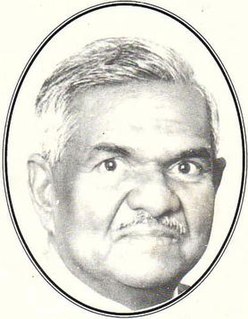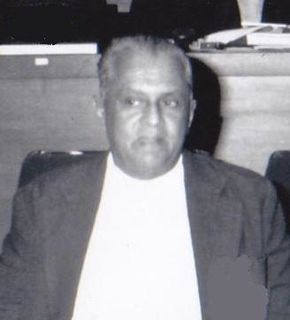
Sirima Ratwatte Dias Bandaranaike, commonly known as Sirimavo Bandaranaike, was a Sri Lankan stateswoman. She became the world's first non-hereditary female head of government in modern history, when she was elected Prime Minister of Sri Lanka in 1960. She served three terms: 1960–1965, 1970–1977 and 1994–2000.

Don Stephen Senanayake was a Sri Lankan statesman. He was the first Prime Minister of Sri Lanka having emerged as the leader of the Sri Lankan independence movement that led to the establishment of self-rule in Sri Lanka. He is considered as the "Father of the Nation".

Solomon West Ridgeway Dias Bandaranaike, frequently referred to as S.W.R.D. Bandaranaike, was the fourth Prime Minister of Ceylon and founder of the Left wing and Sinhalese nationalist Sri Lanka Freedom Party. SWRD Bandaranaike became the prime minister of Ceylon in 1956 and carried out left wing reforms such as nationalizing bus services and introducing legislation to prohibit caste based discrimination. Bandaranaike is also remembered for removing British naval and air bases in Sri Lanka and establishing diplomatic missions with a number of communist states. When the Suez Crisis occurred Bandaranaike stood by Egypt and supported its right to nationalize the Suez Canal Company going against Israel and the UK in the UN. His effort to resolve the Suez Crisis, pleased the Arab Countries. Thus Sri Lanka was appointed as a member of the Suez Advisory Board.

The Sri Lanka Freedom Party is one of the major and most well known political parties in Sri Lanka. It was founded by S.W.R.D Bandaranaike in 1951 and, since then, has been one of the two largest parties in the Sri Lankan political arena. It first came to power in 1956 and since then has been the predominant party in government on a number of occasions. The party is generally considered as having a democratic socialist or progressive economic agenda and is often associated with nationalist Sinhalese parties. The party follows a Non-Aligned foreign policy but always had close ties to socialist nations. The Sri Lanka Freedom Party is a Second Main constituent party in the Sri Lanka People's Freedom Alliance.

The Ceylon Workers' Congress (CWC) is a political party in Sri Lanka that has traditionally represented Sri Lankan Tamils of Indian origin working in the plantation sector of the economy.

Indian Tamils of Sri Lanka are Tamil people of Indian origin in Sri Lanka. They are also known as Hill Country Tamils, Up-Country Tamils or simply Indian Tamils. They are now residents of sri lanka and belong to them. They are partly descended from workers sent from South India to Sri Lanka in the 19th and 20th centuries to work in coffee, tea and rubber plantations. Some also migrated on their own as merchants and as other service providers. These Tamil-speakers mostly live in the central highlands, also known as the Malayakam or Hill Country yet others are also found in major urban areas and in the Northern Province. Although they are all termed as Tamils today, some have Telugu and Malayalee origins as well as diverse South Indian caste origins. They are instrumental in the plantation sector economy of Sri Lanka. In general, socio-economically their standard of living is below that of the national average and they are described as one of the poorest and most neglected groups in Sri Lanka. In 1964 a large percentage were repatriated to India, but left a considerable number as stateless people. By the 1990s most of these had been given Sri Lankan citizenship. Most are Hindus with a minority of Christians and Muslims amongst them. There are also a small minority followers of Buddhism among them. Politically they are supportive of trade union-based political parties that have supported most of the ruling coalitions since the 1980s.

Dudley Shelton Senanayake 19 June 1911 – 13 April 1973), was a Sri Lankan statesman who served as Prime Minister of Ceylon from 1952 to 1953, in 1960 and from 1965 to 1970 and Leader of the Opposition from 1960 to 1964. Senanayake's tenures as prime minister were associated with democratic socialist policies focused on agricultural and educational reforms with a pro-western alignment.

Samuel James Veluppillai Chelvanayakam was a Ceylon Tamil lawyer, politician and Member of Parliament. He was the founder and leader of the Illankai Tamil Arasu Kachchi (ITAK) and Tamil United Liberation Front (TULF) and a political leader of the Ceylon Tamil community for more than two decades.
The origins of the Sri Lankan Civil War lie in the continuous political rancor between the majority Sinhalese and the minority Sri Lankan Tamils. Before and during the early part of colonial rule by Europeans, Sri Lanka was under the rule of three separate kingdoms. War and peace was a status quo between nations, unlike the present status quo of war crimes and terrorism between majorities and minorities. During the colonial rule by Portuguese and then the Dutch, the three sovereign states were ruled as separate entities. The final British colonial rule amalgamated the entire island into a single administrative entity after independence the minorities were handed over to the mercy of the majority who were warring parties before the period of the European colonisation. According to Jonathan Spencer, a social anthropologist from the School of Social and Political Studies of the University of Edinburgh, the war is an outcome of how modern ethnic identities have been made and re-made since the colonial period, with the political struggle between minority Tamils and the Sinhalese-dominant government accompanied by rhetorical wars over archeological sites and place name etymologies, and the political use of the national past.

Between 1948 and 1972, Ceylon was an independent country in the Commonwealth of Nations that shared a monarch with Australia, Canada, New Zealand, the United Kingdom, and certain other sovereign states. In 1948, the British Colony of Ceylon was granted independence as Ceylon. In 1972, the country became a republic within the Commonwealth, and its name was changed to Sri Lanka.
Sri Lankan Tamil nationalism is the conviction of the Sri Lankan Tamil people, a minority ethnic group in the South Asian island country of Sri Lanka, that they have the right to constitute an independent or autonomous political community. This idea has not always existed. Sri Lankan Tamil national awareness began during the era of British rule during the nineteenth century, as Tamil Hindu revivalists tried to counter Protestant missionary activity. The revivalists, led by Arumuga Navalar, used literacy as a tool to spread Hinduism and its principles.
The Bandaranaike–Chelvanayakam Pact was an agreement signed between the Prime Minister of Sri Lanka S. W. R. D. Bandaranaike and the leader of the main Tamil political party in Sri Lanka S. J. V. Chelvanayakam on July 26, 1957. It advocated the creation of a series of regional councils in Sri Lanka as a means to giving a certain level of autonomy to the Tamil people of the country, and was intended to solve the communal disagreements that were occurring in the country at the time.
The Ceylon Citizenship Act No. 18 of 1948 was a controversial law passed by the Ceylon Parliament which did not grant citizenship to Indian Tamils, who were 11% of the population.
Sri Lankan Tamils in India mainly refer to Tamil people of Sri Lankan origin in India and non-resident Sri Lankan Tamil. They are partly who migrated to India and their descendants and mostly refugees from Sri Lanka because of the concluded Sri Lankan Civil War. In general socio economically they are living below poverty line, except few people who settled in India during early times, rich businessmen, and professionals. In Tamil Nadu they are also known as Ceylon Tamils or Jaffna Tamils.
Neil Quintus Dias, CCS, commonly known as N.Q. Dias, was a Sri Lankan civil servant. A career officer of the Ceylon Civil Service, he was the Permanent Secretary of Defence and Foreign Affairs from 1960 to 1965, serving as the de-facto Chief Adviser to Prime Minister Sirimavo Bandaranaike and as Ceylon's High Commissioner to India from 1970 to 1972.

Vallipuram Ponnambalam was a Sri Lankan Tamil politician and teacher. He was a prominent leader of the left-wing in northern Sri Lanka. He served as the secretary of the Jaffna District Committee of the Communist Party of Ceylon. Ponnambalam was noted for his 'clean image' as a political leader.
A by-election for the National State Assembly seat of the Kankesanthurai Electoral District, Jaffna District, Sri Lanka, was held on 6 February 1975. The election was characterised by increased tension and marked a turning point in the emergence of Tamil militancy.

The Sirima–Shastri Pact or Srimavo-Shastri Pact was an agreement that was signed between Sirimavo Bandaranaike, the Prime Minister of Sri Lanka, and Lal Bahadur Shastri, the Prime Minister of India, on 30 October 1964. Officially, it was known as Agreement on Persons of Indian Origin in Ceylon. It was a significant agreement in determining the status and future of people of Indian origin in Ceylon.

The Sirima–Gandhi Pact or Srimavo-Gandhi Pact was an agreement that was signed between Sirimavo Bandaranaike, the Prime Minister of Sri Lanka, and Indira Gandhi, the Prime Minister of India, on 28 June 1974. It was a follow-up agreement of Sirima-Shastri Pact that left 150,000 people of Indian origin in Sri Lanka to future account. Sirima-Shastri Pact agreed to grant Ceylonese citizenship to 300,000 Indian population in Sri Lanka and 525,000 people repatriation to India.

Cyril Esmond Lucien Wickremesinghe was a Ceylonese press baron, lawyer, and a successful entrepreneur. He also played key role in defeating Sirimavo Bandaranaike that bought United National Party's Dudley Senanayake to power in 1965's Parliamentary Election. He is also father of the United National Party leader and Prime Minister Ranil Wickremesinghe.













